Ode to the Nursing Home Dining Hall in all it's Former Glory
Once a bustling center of my nursing home - where residents gathered three times per day to eat together, socialize with fellow residents and staff.
Three times per day, for years, at pre-appointed times (usually around 7am, 11am, and 5pm), a ritual took place. Residents are slowly coaxed & led, some pushed, a few motoring with their electrically powered wheelchairs and scooters into our main dining hall.
Why do we have Dining Halls in Nursing Homes?
This would seem like a funny question to ask a few years ago when they were basically taken for granted - I mean - literally every nursing home has one. But let’s talk about it.
First thing? A few key practical reasons.
It’s efficient - residents in nursing homes have a variety of functional deficits. Having all of those residents together in one room at mealtime allows nursing to provide assistance to several assigned to them at once (e.g., such as with setting up their trays, helping them to affix napkins, etc.)
It maximizes safety - for any number of residents, mealtimes are high risk times. Older adults in nursing homes tend to have impaired swallow reflexes and other issues that make them at high risk for choking - which means having all of the nursing staff circulating the area to keep eyes on them is key.
Then there’s some clinical reasons.
One of the most important ones is call “social facilitation” in eating. Like it sounds - it refers to the phenomenon of people, when they get together - they tend to eat significantly more than when they’re by themselves. From a 2017 article by C. Peter Herman in Journal of Eating Disorders:
social facilitation of eating refers to the empirical fact that people eating with others eat more - often a lot more - than do people eating alone. The basic phenomenon contrasts solo diners with group diners, with the groups consisting of 2 or more people [1]. The effect seems to follow social impact theory [2], such that the more people there are in the group, the bigger the effect
For older adults, this is no insignificant thing. First off - unlike with us younger adults and kids in typical western (and particularly American) culture - who struggle with keeping weight off, the problem is reversed in long term care. For any number of reasons, starting from around the age of 60 and up, longevity and health in older adults becomes more associated with being somewhat overweight as opposed to slim and trim.1
One reason for this - older adults tend to have less overall resiliency than younger folks, so a bad infection or injury requires more reserves, extra calories - than otherwise.
Also - there’s the everpresent risk of failure to thrive. What is this? It’s as much of a syndrome as it is a catchall term to describe what happens when an older adult in a sense gives up on living - “resulting in a downward spiral of poor nutrition, weight loss, inactivity, depression and decreasing functional ability.”
Then There are the Things you Can’t Measure
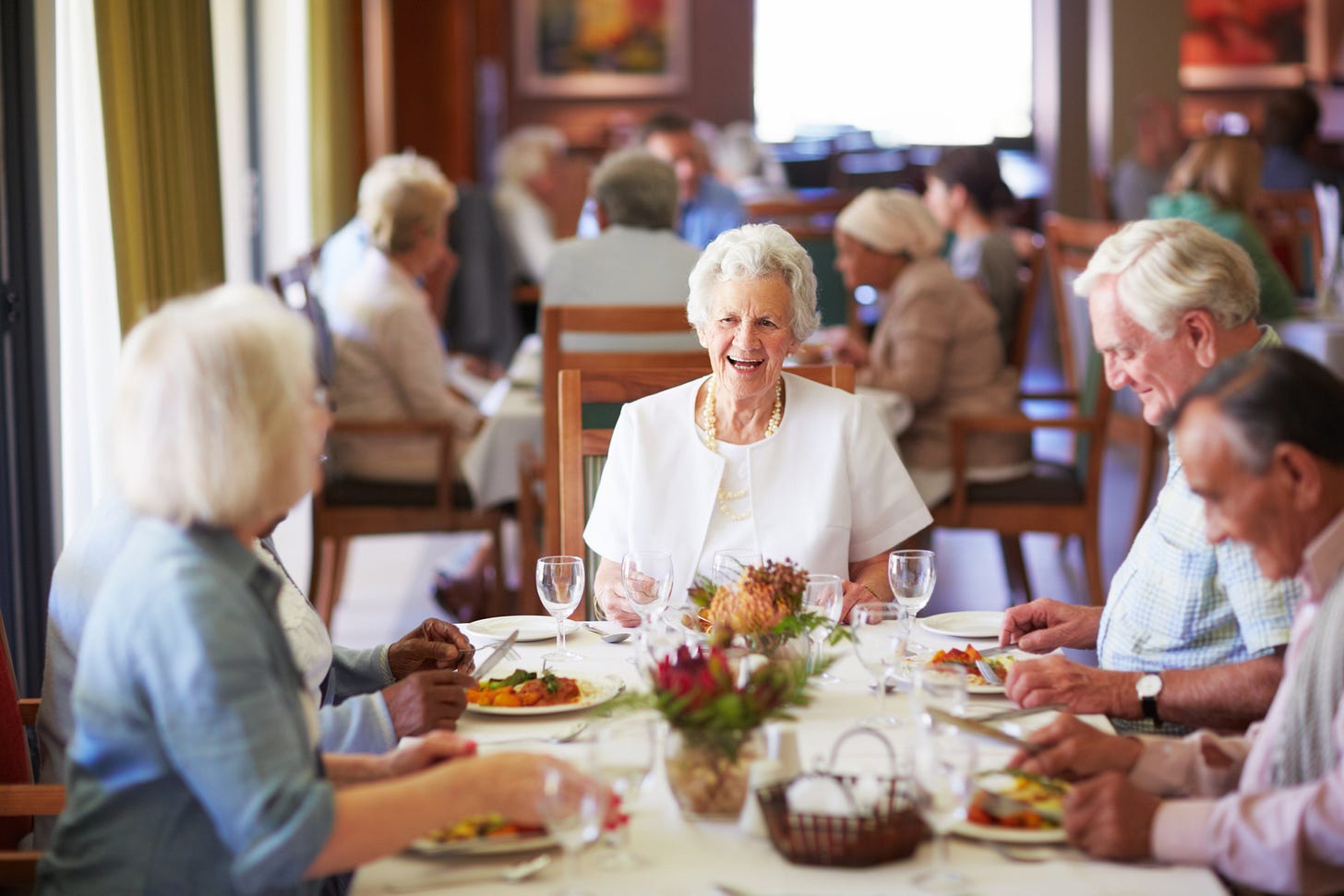
When my residents ate together three times per day, this was, for many of the less-mobile (and perhaps somewhat introverted) residents, the only time where residents from different nursing units would be able to see each other. Similarly, since we have a practice of so-called consistent assignment for nursing staff (e.g., nursing staffing is designed so that nurses do not tend to ‘float’ from unit to unit), this used to be time that nursing staff - the ones assigned to the dining hall that day anyways - would be able to interact with each other, all joining in on the task of monitoring and socializing with each other - as well as residents from other units.
This was also the time that our resident chaplaincy staff and a few odd other staff would also eat with the residents (something none of us did often enough). All of this is now gone.
There’s something very primal about eating together in the way it bonds us as families and as communities. We all instinctively know it - “the importance of families eating together” and don’t need the so-called “experts” to tell us.
I don’t know how many other long-term care facilities, assisted living facilities, and senior care facilities other than mine have continued to ban congregate dining amongst their residents - but I know that for my nursing home, something very vital has been lost.
We’ve lost our three-times-per day social beating heart. And sad to say, I’m not sure I know when it’s coming back.
This has real consequences. Loss of community, loss of connection, loss of self, social atomization. Our residents are losing themselves because they are not able to connect with others the way they used to.
Loss of the dining hall - just another brick in the wall.
As an aside - there’s a very interesting literature about obesity and cognitive impairment. To put things very generally, up until about late middle age / early older adulthood (mid-60s) - there’s a pretty established negative relationship between scores on cognitive tests and BMI (in other words, the more obese you are the worse your memory and thinking tends to be). However, this relationship tends to break down for older adults - with a certain level of mild obesity or overweight being protective.

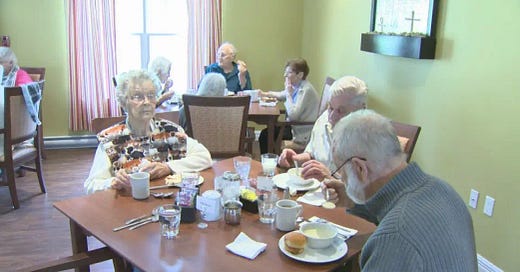


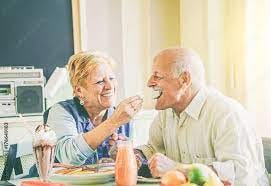
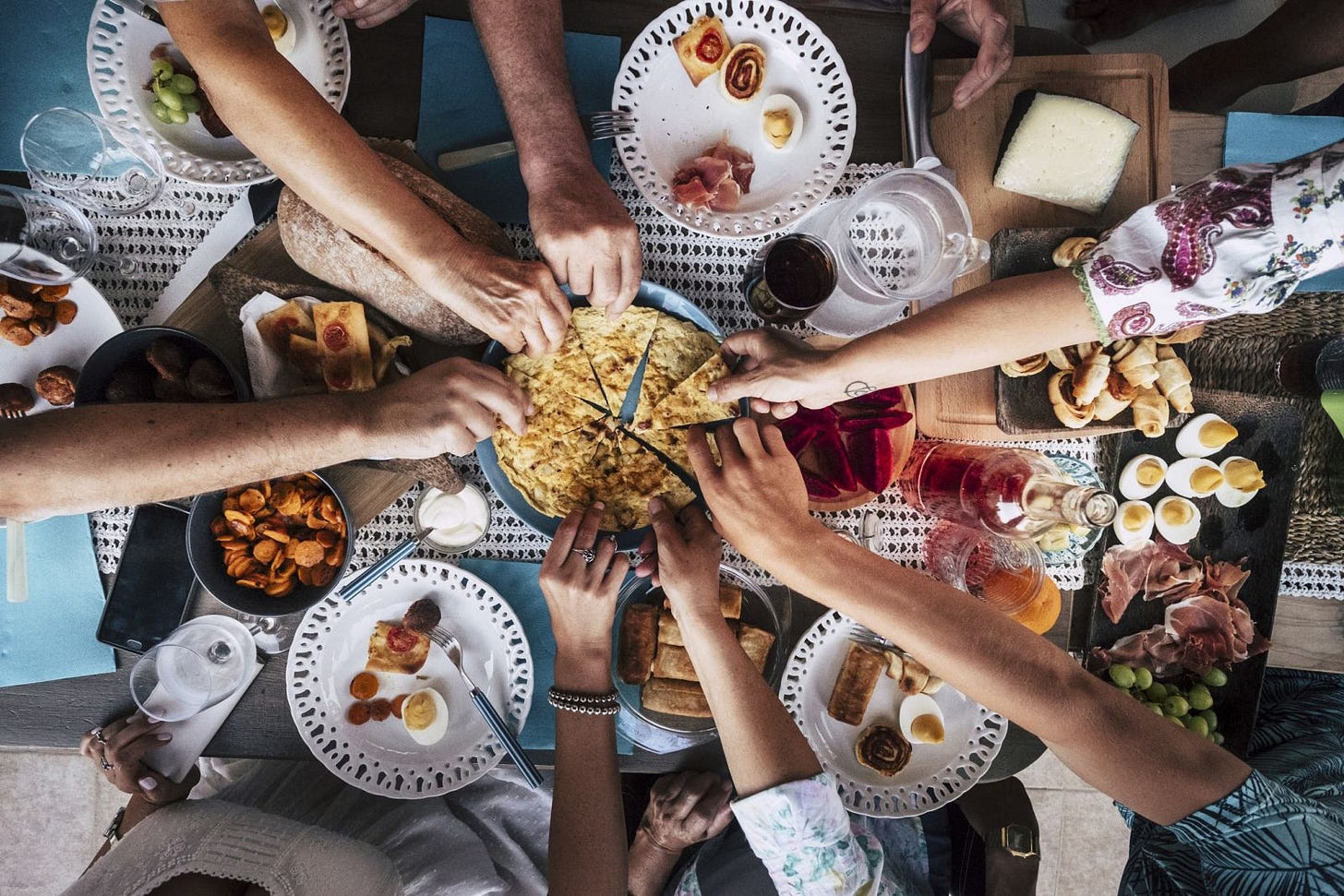
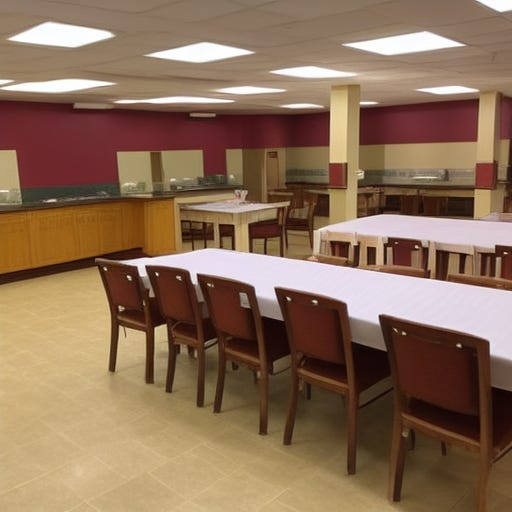
I think of the contrast with the final photos of Queen Elizabeth just days before her death. Yes, she looked frail but also very happy, smiling unmasked as she met the new (also unmasked) British Prime Minister. She had bruising on her hand (maybe from an IV line) and she was using a cane but her joy was palpable. She died with her son and daughter at her bedside. The saddest photo I saw of her was the one where she sat alone in a mask at Westminster as her husband Phillip was laid to rest a year ago. We've consigned so many of our American seniors to lives of loneliness without smiles, deaths in isolation, a prison-like mere existence. It is a travesty and a crime. I don't know how to make this stop but we MUST stop this.
it is horrible.
Covid stole humanity via our own elected officials.
Been the cna, been the family member but I haven't been able to find the words to express my disgust with what's happened.